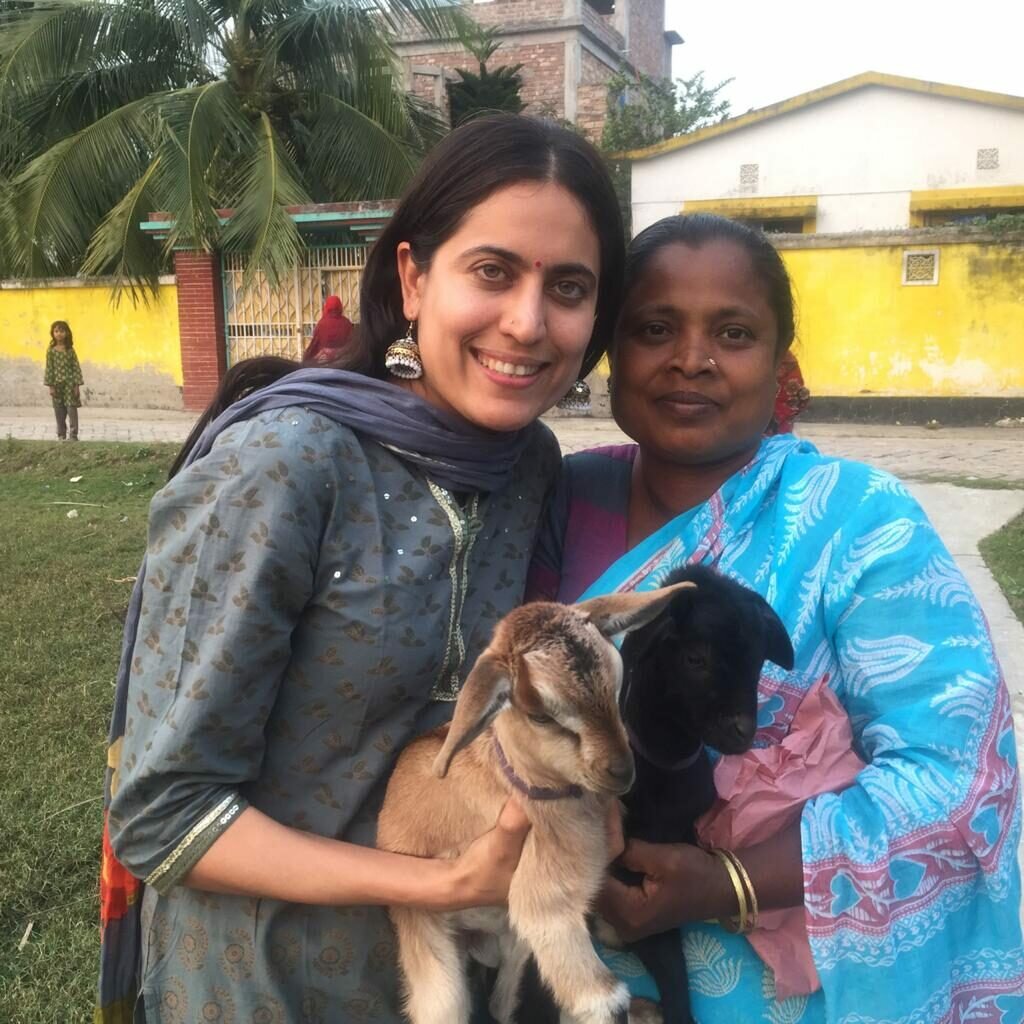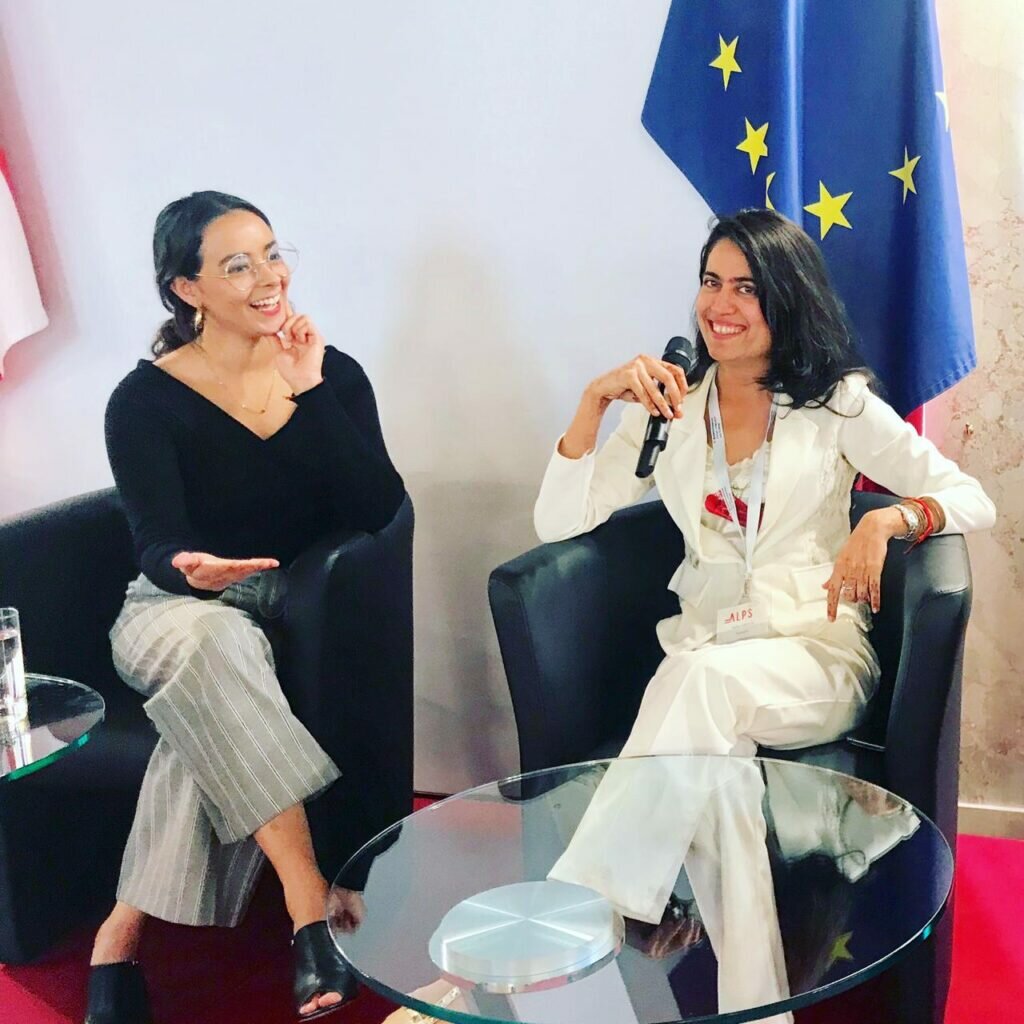Big tech’s reckoning has hit like a sledgehammer, breaking out a cat’s cradle of implications we’re still no closer to apprehending. See: Jack Dorsey stonily prevaricating his way through a five-and-a-half-hour congress hearing about misinformation in his glinting nose ring; or Facebook’s all too blithe transmogrification into Meta. Behind this baffling picture, is a male-dominated sector plagued by accusations of sexism and cronyism.
For all the tech bro toxicity the world can stomach though, there are those who pitch the industry as a vehicle for ameliorating real issues such as gender inequality. Financial inclusion specialist Neha Mehta is one such individual.
She’s witnessed firsthand, while on a fact-finding mission in Bangladesh initiated by non-profit Voluntary Service Overseas, how technology can be an enabler for remote communities overlooked by banks. Here, in one of the world’s top apparel manufacturing nations at the forefront of digital acceleration, fintech companies such as Bkash are facilitating fuss-free remittances through mom-and-pop stores sans a Wi-fi connection, and disbursing micro-loans and -insurance to the unbanked.
Yet, in loom country where the workforce at garment factories is largely female, a preponderance of women lack access to capital. According to The Global Findex Database, 65 percent of Bangladeshi men have bank accounts compared to 36 percent of women. “Women there are actually earning more than men, but they refuse to talk about it to avoid injuring their egos. Women are smart at handling money, but lack access to financial literacy tools,” she explains.
That’s a demographic Mehta hopes to empower through her work. In 2018, she started Femtech Partners with its finger on the pulse of financial services catering to the unbanked. The fledgling consulting firm was recognised for its contributions to Singapore’s economy and society at the British Chamber of Commerce Singapore Annual Business Awards, 2020.
There is no cap on ambition, and poor people don’t need poor solutions, they actually expect the best service when it comes to investing.
Neha Mehta
And its portfolio reads like an applause of big picture humanitarian efforts. Next to the aforementioned Bangladesh outreach programme, there’s the UK Foreign, Commonwealth, and Development Office’s (FCDO) £1.2 billion Prosperity Fund, for which the company developed a policy towards achieving financial inclusion, gender diversity, poverty reduction and economic reform in ASEAN countries.
Within Singapore, they’ve worked with investment management behemoth BlackRock to promote upward social mobility among foreign domestic workers, by introducing them to tools and platforms for micro-investments. “Most of the helpers were eager to understand how they could improve their lives and spent a lot of time watching educational Youtube videos; some had even invested in cryptocurrencies. There is no cap on ambition, and poor people don’t need poor solutions, they actually expect the best service when it comes to investing,” she asserts.
Smash the patriarchy
-

Neha Mehta speaking at a blockchain event -

Neha Mehta in Austria representing Singapore in a leadership programme.
For as far as she can recall, the 36-year-old has “always had a soft corner for people who have no access to education or equal rights.” Perhaps it’s the upshot of being sensitised to the gnawing chasm of socioeconomic disparity from a young age. Born in Agra, home to the elegiac Taj Mahal, her family later moved to New Delhi, where she grew up under a middle-class upbringing. Back then, she says, there was no indication that the city would swell into the interface-glutted startup capital it is today. Before the surge of high-speed internet upended playtime as we know it, her childhood was largely spent cavorting outdoors.
“I grew up close to a village and was exposed to poverty firsthand. My parents told me I would help get kids enrolled into school, and I have vague memories of arranging for their admission and paying their fees,” she recalls.
Despite living in a patriarchal society, she says her late father, who worked in a bank, “gave us a great platform not only to be equal to men but to experience the world on our own terms.” Which informed her decision to exclude her last name from her Singapore NRIC. “My father always wanted me to have my own identity; he said he would rather be recognised as my father than the other way round,” she explains.
Such ideological persuasions, coupled with an honour’s roll of extracurricular activities – in retrospect, she resented her father for forcing her to present the news during school assembly – set the tone for a boldly meandering career. A commerce and law graduate, Mehta came to Singapore to work as a foreign qualified lawyer with a Swiss law firm, but drifted towards finance to achieve better work-life balance. This was not before her brief stints as a model and insurance agent that were, predictably, jettisoned.
“I had a huge falling out with my parents who were against the idea – imagine making such bold choices in a middle-class Indian family,” she recounts. But why the anti-corporate bent? “My sister and I grew up watching Miss India and Miss Universe and that really screwed up our realities. My sister missed the bus when she became a SIA girl – so I thought I’d do justice to the cause and become a model,” she says, laughing throatily. Not that she has any regrets. “If nothing else, I know what not to do when you are trying to be a model,” she says.
Tech as an equaliser
Ironic quips aside, her current role at the intersection of finance and social impact is positioned to tackle weighty issues, quashing long-held structures that shunt developing communities to the side. In a region where six in 10 South-east Asians are estimated to be unbanked, fintech – whose adoption has been accelerated by the pandemic – is widely recognised as a game-changer. Today, alternate credit scoring systems can, for instance, assess an individual’s credit worthiness through their historical interactions on social media apps.
Naturally, that throws up questions about data privacy issues, especially knowing that places in want of greater financial inclusion lack the necessary regulatory frameworks. Mehta sees this as a moot point, in the context of uplifting the marginalised. “Most of the time, last mile customers don’t really have a digital footprint, which means you can be sure their data and purchasing history is not being catalogued. In a country like Bangladesh, you don’t really need the internet to run Facebook,” she explains.
But surely greater protections are needed for those vulnerable to exploitation, with the tailwinds behind digital acceleration billowing across the developing world? Mehta, who is writing a book about super apps, concurs that “data is the new oil” plumbed by tech giants, and that it is thus important to regulate the procurement of data and stipulate their usage terms.
We need a mindset shift and make conscious choices to be seen with companies that are not just doing greenwashing but really want to drive the green economy for generations to come
Neha Mehta
Those are screws that need to be tightened by the policy wonks, though. Mehta’s attentions are now firmly turned to green fintech, a burgeoning space where she’s encouraged by startups that plant trees as carbon credits, and apps that allow customers to assess companies’ carbon footprint. Femtech Partners is working with a major Singapore university on a research project exploring opportunities for underserved groups, such as people with disabilities, in the green economy.
“Sustainability is where the real future is, because we have realised over the pandemic that the old ways of living are no longer valid. We need a mindset shift and make conscious choices to be seen with companies that are not just doing greenwashing but really want to drive the green economy for generations to come,” she says.
The entrepreneur also mentors budding female fintech professionals and has plans to start a venture capital fund investing in female-led companies. She says too little capital is being channeled towards the latter, and is all for using a gender prism.
“Imagine if my future kids automatically believed that the industry doesn’t belong to them purely because they don’t see enough role models. Every time I think of this, I think it is time to bring change,” she says.


